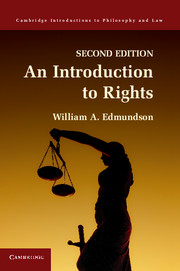Book contents
- Frontmatter
- Contents
- Preface to the First Edition
- A Note on the Second Edition
- A Note on Citation Form
- List of Tables
- Part One The First Expansionary Era
- Part Two The Second Expansionary Era
- 6 The Universal Declaration, and a Revolt Against Utilitarianism
- 7 The Nature of Rights
- 8 A Right to Do Wrong? Two Conceptions of Moral Rights
- 9 The Pressure of Consequentialism
- 10 What Is Interference?
- 11 The Future of Rights
- 12 Conclusion
- Bibliographical Notes
- References
- Index
6 - The Universal Declaration, and a Revolt Against Utilitarianism
from Part Two - The Second Expansionary Era
Published online by Cambridge University Press: 05 June 2012
- Frontmatter
- Contents
- Preface to the First Edition
- A Note on the Second Edition
- A Note on Citation Form
- List of Tables
- Part One The First Expansionary Era
- Part Two The Second Expansionary Era
- 6 The Universal Declaration, and a Revolt Against Utilitarianism
- 7 The Nature of Rights
- 8 A Right to Do Wrong? Two Conceptions of Moral Rights
- 9 The Pressure of Consequentialism
- 10 What Is Interference?
- 11 The Future of Rights
- 12 Conclusion
- Bibliographical Notes
- References
- Index
Summary
The end of the Second World War marked a watershed in the history of rights. In the wake of the massive civilian suffering caused during the war – much of it knowingly and even intentionally inflicted, and on a scale without historical precedent – there was a resurgence of interest in international cooperation to prevent war and, failing that, to mitigate its severity. The United Nations was founded in 1945, and in 1948 its General Assembly unanimously adopted the Universal Declaration of Human Rights (the Soviet bloc, Saudi Arabia, and South Africa abstaining). Its preamble contained the following recitations:
Whereas recognition of the inherent dignity and of the equal and inalienable rights of all members of the human family is the foundation of freedom, justice and peace in the world,
Whereas disregard and contempt for human rights have resulted in barbarous acts which have outraged the conscience of mankind ….
Now, Therefore,
The General Assembly proclaims
This universal declaration of human rights as a common standard of achievement for all peoples and nations ….
- Type
- Chapter
- Information
- An Introduction to Rights , pp. 85 - 95Publisher: Cambridge University PressPrint publication year: 2012



